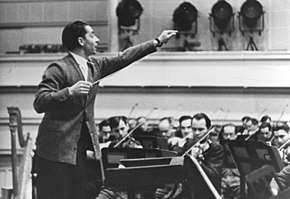Maestro
Maestro (/ˈmaɪstroʊ/; from the Italian maestro [maˈestro; maˈɛstro], meaning "master" or "teacher")[1] is an honorific title of respect (plural: maestri, feminine: maestra). The term is most commonly used in the context of Western classical music and opera, in line with the ubiquitous use of Italian musical terms.

Herbert von Karajan conducting in 1941
In music
The word maestro is most often used in addressing or referring to conductors. Less frequently, one might refer to respected composers, performers, impresarios, musicologists, and music teachers.
In the world of Italian opera, the title is also used to designate a number of positions within the orchestra and company that have specific duties during rehearsal and performance. These include:
- Maestro sostituto or maestro collaboratore: musicians who act as répétiteurs and assistant conductors during performances.
- Maestro concertatore, the keyboard continuo player, who prepares singers and leads rehearsals.[2]
- Maestro direttore: the leader of the first violins of the orchestra (see concertmaster), who may also have administrative duties such as hiring and paying musicians[3]
- Maestro suggeritore: the prompter
gollark: They have CBs. I wonder why they bred it with a 2G. Probably an accident.
gollark: Now the eternal wait and wondering begins.
gollark: I offered my spare CB Magma. That prize is probably worth *something*.
gollark: They were also lucky to get it before the Wyrmrequirementpocalypse.
gollark: Madness, is it not?
References
- Online Etymology Dictionary
- Root, Deane L., ed. (2001). "Maestro concertatore". The New Grove Dictionary of Music and Musicians. Oxford University Press.
- Root, Deane L., ed. (2001). "Maestro direttore". The New Grove Dictionary of Music and Musicians. Oxford University Press.
Further reading
- Lebrecht, Norman (1 January 2001) [First published 1991]. The Maestro Myth: Great Conductors in Pursuit of Power (2nd revised ed.). Citadel Press. ISBN 0-8065-2088-4.
- Kennedy, Michael (2006), The Oxford Dictionary of Music, 985 pages, ISBN 0-19-861459-4
- Warrack, John; West, Ewan (15 October 1992). The Oxford Dictionary of Opera. Oxford University Press, USA. ISBN 0-19-869164-5.
This article is issued from Wikipedia. The text is licensed under Creative Commons - Attribution - Sharealike. Additional terms may apply for the media files.